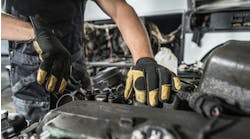Parker told Fleet Owner that a growing number of communities are taking steps to ban engine brake use as a way to reduce noise pollution, an issue that may be driven in part by unnecessary use of engine retarders by truck drivers.
"Engine brakes offer a very efficient and effective retarding system, but noise is their downfall," he explained. "No technology exists to be able to eliminate the noise problem because it is inherent in the function of the brake itself."
But a big part of the noise issue, Parker said, comes from a small number of Class 8 drivers who tend to use their engine brakes in the city for regular braking rather than steep long slopes. He said this spoils the image for the rest of the drivers who do use their engine brakes only when necessary in city areas.
What engine brakes do is turn a diesel engine into an air compressor, meaning the engine absorbs energy instead of producing it, which Parker said creates a retarding effect to slow down both the engine and vehicle quickly. A similar effect can be created with what's known as exhaust brakes, a technology that eliminates the noise produced by engine brakes. However, exhaust brakes don't produce the same level of braking power.
"Engine brakes are more expensive than exhaust brakes and generally provide twice the retarding performance," Parker said. "The tendency then is to have engine brakes on Class 8 trucks and exhaust brakes on Class 3-7 vehicles.
He said that Pacbrake has tried a combination engine and exhaust brake called the SuperPAC. The product worked well but the engine brake still generated noise when in operation.
"Another option is for trucks to be equipped with both engine and exhaust brakes," he said. "This idea has not been well received due to the added costs involved in purchasing and installing two systems."


